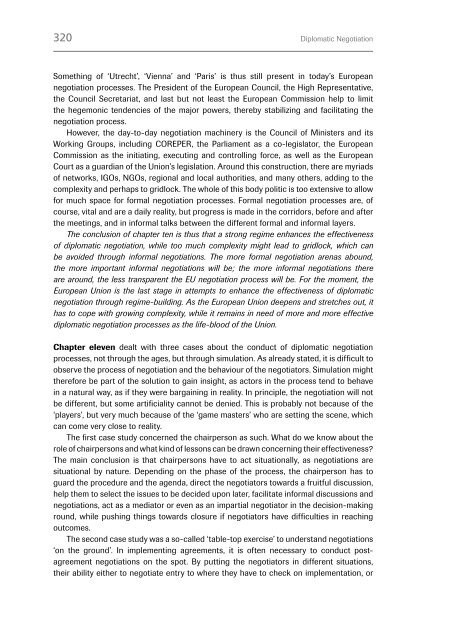Diplomatic Negotiation
Diplomatic_Negotiation_Web_2015
Diplomatic_Negotiation_Web_2015
You also want an ePaper? Increase the reach of your titles
YUMPU automatically turns print PDFs into web optimized ePapers that Google loves.
320 <strong>Diplomatic</strong> <strong>Negotiation</strong><br />
Something of ‘Utrecht’, ‘Vienna’ and ‘Paris’ is thus still present in today’s European<br />
negotiation processes. The President of the European Council, the High Representative,<br />
the Council Secretariat, and last but not least the European Commission help to limit<br />
the hegemonic tendencies of the major powers, thereby stabilizing and facilitating the<br />
negotiation process.<br />
However, the day-to-day negotiation machinery is the Council of Ministers and its<br />
Working Groups, including COREPER, the Parliament as a co-legislator, the European<br />
Commission as the initiating, executing and controlling force, as well as the European<br />
Court as a guardian of the Union’s legislation. Around this construction, there are myriads<br />
of networks, IGOs, NGOs, regional and local authorities, and many others, adding to the<br />
complexity and perhaps to gridlock. The whole of this body politic is too extensive to allow<br />
for much space for formal negotiation processes. Formal negotiation processes are, of<br />
course, vital and are a daily reality, but progress is made in the corridors, before and after<br />
the meetings, and in informal talks between the different formal and informal layers.<br />
The conclusion of chapter ten is thus that a strong regime enhances the effectiveness<br />
of diplomatic negotiation, while too much complexity might lead to gridlock, which can<br />
be avoided through informal negotiations. The more formal negotiation arenas abound,<br />
the more important informal negotiations will be; the more informal negotiations there<br />
are around, the less transparent the EU negotiation process will be. For the moment, the<br />
European Union is the last stage in attempts to enhance the effectiveness of diplomatic<br />
negotiation through regime-building. As the European Union deepens and stretches out, it<br />
has to cope with growing complexity, while it remains in need of more and more effective<br />
diplomatic negotiation processes as the life-blood of the Union.<br />
Chapter eleven dealt with three cases about the conduct of diplomatic negotiation<br />
processes, not through the ages, but through simulation. As already stated, it is difficult to<br />
observe the process of negotiation and the behaviour of the negotiators. Simulation might<br />
therefore be part of the solution to gain insight, as actors in the process tend to behave<br />
in a natural way, as if they were bargaining in reality. In principle, the negotiation will not<br />
be different, but some artificiality cannot be denied. This is probably not because of the<br />
‘players’, but very much because of the ‘game masters’ who are setting the scene, which<br />
can come very close to reality.<br />
The first case study concerned the chairperson as such. What do we know about the<br />
role of chairpersons and what kind of lessons can be drawn concerning their effectiveness?<br />
The main conclusion is that chairpersons have to act situationally, as negotiations are<br />
situational by nature. Depending on the phase of the process, the chairperson has to<br />
guard the procedure and the agenda, direct the negotiators towards a fruitful discussion,<br />
help them to select the issues to be decided upon later, facilitate informal discussions and<br />
negotiations, act as a mediator or even as an impartial negotiator in the decision-making<br />
round, while pushing things towards closure if negotiators have difficulties in reaching<br />
outcomes.<br />
The second case study was a so-called ‘table-top exercise’ to understand negotiations<br />
‘on the ground’. In implementing agreements, it is often necessary to conduct postagreement<br />
negotiations on the spot. By putting the negotiators in different situations,<br />
their ability either to negotiate entry to where they have to check on implementation, or


